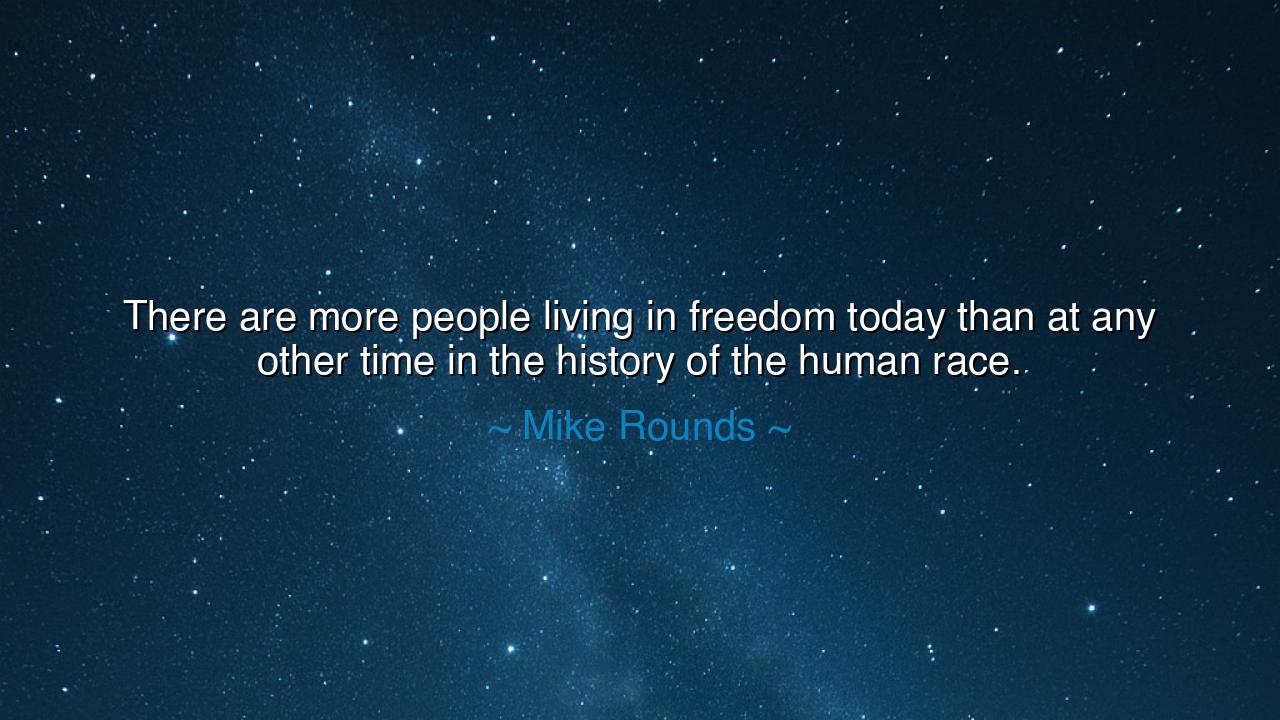
There are more people living in freedom today than at any other
There are more people living in freedom today than at any other time in the history of the human race.






In a time when nations stand at the crossroads of history, Mike Rounds proclaimed a truth both humbling and triumphant: “There are more people living in freedom today than at any other time in the history of the human race.” These words are not merely an observation—they are a celebration of humanity’s long and painful ascent from bondage to liberty. They remind us that freedom, which once belonged only to kings and conquerors, has become the shared birthright of millions. And yet, beneath the triumph lies a quiet warning: that freedom, though vast, is fragile; that it must be guarded with wisdom and gratitude, lest the hard-won victories of ages fade into dust.
In the ancient world, freedom was a rare jewel, possessed by few and paid for in blood. The citizens of Athens first tasted its sweetness, building a democracy that echoed through the centuries. Yet even there, liberty belonged to the few—men of wealth and birth—while slaves and women lived in silence. Rome, too, spoke of freedom while its empire rested on chains. Only through struggle, through the defiance of the oppressed, did the idea begin to grow—that every soul was born equal beneath the sun. It took millennia of courage, rebellion, and vision for that seed to flourish into the world we know today, where billions breathe the air of self-determination.
Think of the abolition of slavery, that great turning of the tide. Once, vast continents thrived upon human bondage. Then came voices like Frederick Douglass, Harriet Tubman, and Abraham Lincoln, who lifted humanity from its darkest shadow. Their struggle became the cornerstone of a new moral order. The chains were broken not only from bodies but from minds. And from that liberation arose new revolutions—the rise of nations governed by the consent of the people, the victory of civil rights movements, and the spread of democracy across lands once silenced by tyranny. Rounds’s words are the echo of all these triumphs—the testament of generations who dared to believe that freedom was not the privilege of a few, but the destiny of all.
Yet the wise know that freedom is never static. It is a living flame, passed from age to age, from hand to trembling hand. Even now, as more people live free than ever before, there are those who walk in darkness—oppressed by fear, corruption, or ignorance. The world is more connected than ever, yet also more divided in spirit. The lesson of history is this: freedom must be renewed through vigilance, compassion, and courage. It is not the gift of governments, but the labor of conscience. To live free is not merely to be unchained—it is to think freely, speak truthfully, and act justly.
Consider the story of Nelson Mandela, who spent twenty-seven years in prison for daring to dream of a free South Africa. When he emerged, he did not speak with bitterness but with grace. “For to be free,” he said, “is not merely to cast off one’s chains, but to live in a way that respects and enhances the freedom of others.” This is the wisdom that completes Rounds’s vision: freedom is not measured by numbers alone, but by how deeply it shapes our hearts and actions. The progress of humanity is not only in how many are free, but in how well we honor that freedom through justice and mercy.
The origin of Rounds’s quote lies in the modern triumph of democracy—the expansion of liberty to nations once bound under totalitarian rule, the fall of the Berlin Wall, and the dawn of independence for peoples long silenced. It is a reflection of the cumulative courage of generations—the soldiers who fought tyranny, the reformers who defied injustice, the citizens who built institutions of equality. His words celebrate not perfection, but progress—the long climb of humankind toward the light of dignity.
So let this truth be carried into your heart: freedom is the sacred inheritance of struggle. It is the voice of every soul that has ever refused to bow before oppression. Cherish it not as a possession, but as a responsibility. Learn your history, honor those who came before, and defend the rights of those still voiceless. For as Rounds reminds us, we live in the freest era known to man—not by chance, but by the labor of the brave. Let us not grow complacent beneath this blessing, but worthy of it. For when we guard freedom with gratitude and wisdom, we ensure that its light will never again be extinguished from the face of the earth.






AAdministratorAdministrator
Welcome, honored guests. Please leave a comment, we will respond soon